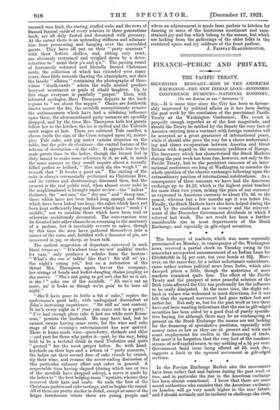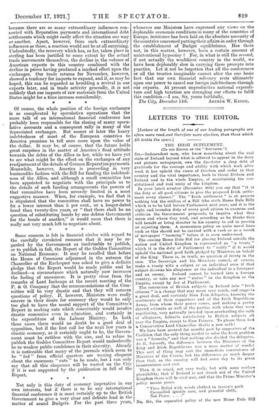FINANCE—PUBLIC AND PRIVATE.
THE PACIFIC TREATY.
SECURITIES BUOYANT—RISE IN THE AMERICAN EXCHANGE—THE NEW INDIAN LOAN—ECONOMIO CONFERENCE RUMOURS—NATIONAL ECONOMY. [To THE Enrroa or THE " SFEcTsTon."3 SIB,—It is some time since the City has been so favour, ably impressed by political affairs as it has been during the past week by the conclusion of the provisional Pacific Treaty at the Washington Conference. The event is properly enough regarded as of the first magnitude, and should the Treaty be ratified by the Senate the very fact of America entering into a contract with foreign countries will be accepted as a great guarantee of international peace, while it should also pave the way for a closer understand- ing and closer co-operation between America and Great Britain with regard to the economic problems of Europe. The buoyancy which has characterized the Stock Markets during the past week has been due, however, not only to the Pacific Treaty, but to the persistent rumours of an inter- national conference ere long at Washington to consider the whole question of the chaotic exchanges following upon the extraordinary position of international indebtedness. As a consequence of these rumours we have had the American exchange up to $4.23, which is the highest point touched for more than two years, raising the price of our currency as expressed in American currency to about 17s. 6d. to the pound, whereas but a few months ago it was below 14s. Finally, the Stock Markets have also been helped during the week by the continued ease in money and the reinvest- ment of the December Government dividends to which I referred last week. The net result has been a further considerable rise in most departments of the Stock Exchange, and especially in gilt-edged securities.
* * * The buoyancy of markets, which was more especially pronounced on Monday, in consequence of the Washington news, received a partial check on Tuesday owing to the somewhat unexpected announcement of an Indian Loan for £10,000,000 in 51. per cent. ten year bonds at 93k. More- over, on the same day, by a rather unfortunate coincidence, came rather serious political news from India, which also damped prices a little, though the undertone of most markets remained quite firm. The effect of the Pacific Treaty and the prospect of some peaceful solution of the Irish crisis affected the City too profoundly for the influence to be easily dissipated. At the same time, the slight set- back in values was welcomed in most directions, for it was felt that the upward movement had gone rather fast and rather far. Not only so, but for the past week or two there have not been wanting indications that the rise in gilt-edged securities has been aided by a good deal of purely specula- tive buying, for although there may be no contangoing at present on the Stock Exchange the means are not lacking for the financing of speculative positions, especially with money rates as low as they are at present and with such scant employment for credits in the financing of trade. Nor must it be forgotten that the very fact of the constant stream of nedf capital issues, to say nothing of a 5i per cent. Government bond issue being offered ad a. each day, suggests a limit to the upward movement in gilt-edged sections. * * * In the Foreign Exchange Market also the movements have been rather fast and furious during the past week or two, and in particular the rise in the American exchange has been almost sensational. I know that there are some sound authorities who consider that the American exchange on London will go very much higher in the near future, and I should certainly not be inclined to challenge the views because there are so many extraordinary influences con- nected with Reparation payments and international debt settlements which might easily affect the situation one way or another. Apart, however, from such extraordinary influences as those, a reaction would not be at all surprising. Undoubtedly, the recovery which has, so far, taken place in sterling has been justified to some extent by the actual trade movements themselves, the decline in the volume of American exports to this country combined with the decline in prices having produced a marked effect upon the exchanges. Our trade returns for November, however, showed a tendency for imports to expand, and if, as may be hoped, this can be regarded as heralding a revival in our exports later, and in trade activity generally, it is not unlikely that our imports of raw materials from the United States might for a time increase considerably.
* * Of course, the whole position of the foreign exchanges is so complicated by speculative operations that the mere talk of an international financial conference has probably been responsible for the closing of many specu- lative accounts and a consequent rally in many of the depreciated exchanges. But sooner or later the heavy indebtedness of most of the European countries to America promises to tell once more upon the value of the dollar. It may be, of course, that the future holds great surprises in the matter of America's final attitude towards the debts of the Allies to her, while we have yet to see what might be the effect on the exchanges of any readjustment of the details of German Reparation payments. Meanwhile, however, America is proceeding in very businesslike fashion with the Bill for funding the indebted- ness of the Allies, and although a small committee has been appointed to negotiate with the principals as to the details of such funding arrangements the powers of that committee have been severely limited in a most suggestive manner. When, for example, we find that it is stipulated that the committee shall have no power to fix a lower interest than 5 per cent., or a longer-dated bond than twenty-five years, or " that there shall be no question of substituting bonds by one debtor Government for the bonds of another," it would seem that there is really not very much left to negotiate about.
Some concern is felt in financial circles with regard to the carefully circulated rumours that it may be re- garded. by the Government as inadvisable to publish, or to publish in full, the Report of the Geddes Committee on National Economy. It may be recalled that before the House of Commons adjourned in the autumn the Chancellor of the Exchequer was asked to give a definite pledge that the Report would be made public and he declined—a circumstance which naturally now increases the feeling of uneasiness. It is pretty clear from the remarks of Lord Inchcape at the recent meeting of the P. & 0. Company that the recommendations of the Com- mittee will be very drastic and that they will concern questions of policy. If, however, Ministers were really sincere in their desire for economy they would be only too glad to have the moral support of the Committee's Report in making cuts which conceivably would involve drastic economies even in education, and certainly in the expenditure of the Labour Ministry. In both these cases there would no doubt be a good deal of opposition, but if the first call for the next few years is drastic economy, as it certainly ought to be, the Govern- ment must be ruthless with the axe, and to refuse to publish the Geddes Committee Report would undoubtedly be to weaken public confidence in their sincerity. Already it is noticeable that many of the journals which seem to be " fed " from official quarters are waxing eloquent about the enormous " cuts " to be made, but I can only say that all this eloquence will be wasted on the City if it is not supported by the publication in full of the Report. * Not only is this duty of economy imperative in our own interests, but if there is to be any international financial conference it is most certainly up to the British Government to give a very clear and definite lead in the matter of sound Budgets. For the past three years, whenever our Ministers have expressed any views on the deplorable economic conditions in many of the countries of Europe, insistence has been laid on the absolute necessity of the countries concerned putting their affairs in order through the establishment of Budget equilibriums. Has there not, in this matter, however, been a certain amount of unintentional hypocrisy ? For, in what is still the second, if not actually the wealthiest country in the world, we have been deplorably slow in carrying these precepts into practice. Let it not be forgotten that all the conferences or all the treaties imaginable cannot alter the one basin fact that our own financial solvency rests ultimately upon our power to cancel our foreign indebtedness through our exports. At present unproductive national expendi- ture and high taxation are strangling our efforts to fulfil this condition.—I am, Sir, yours faithfully,







































 Previous page
Previous page